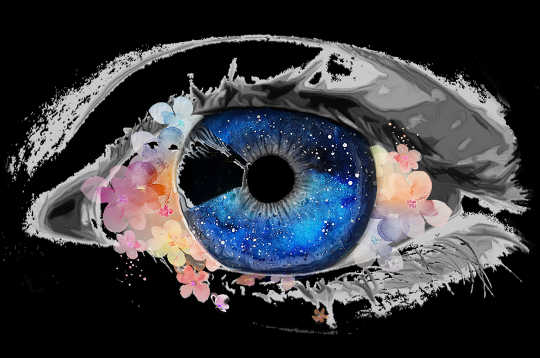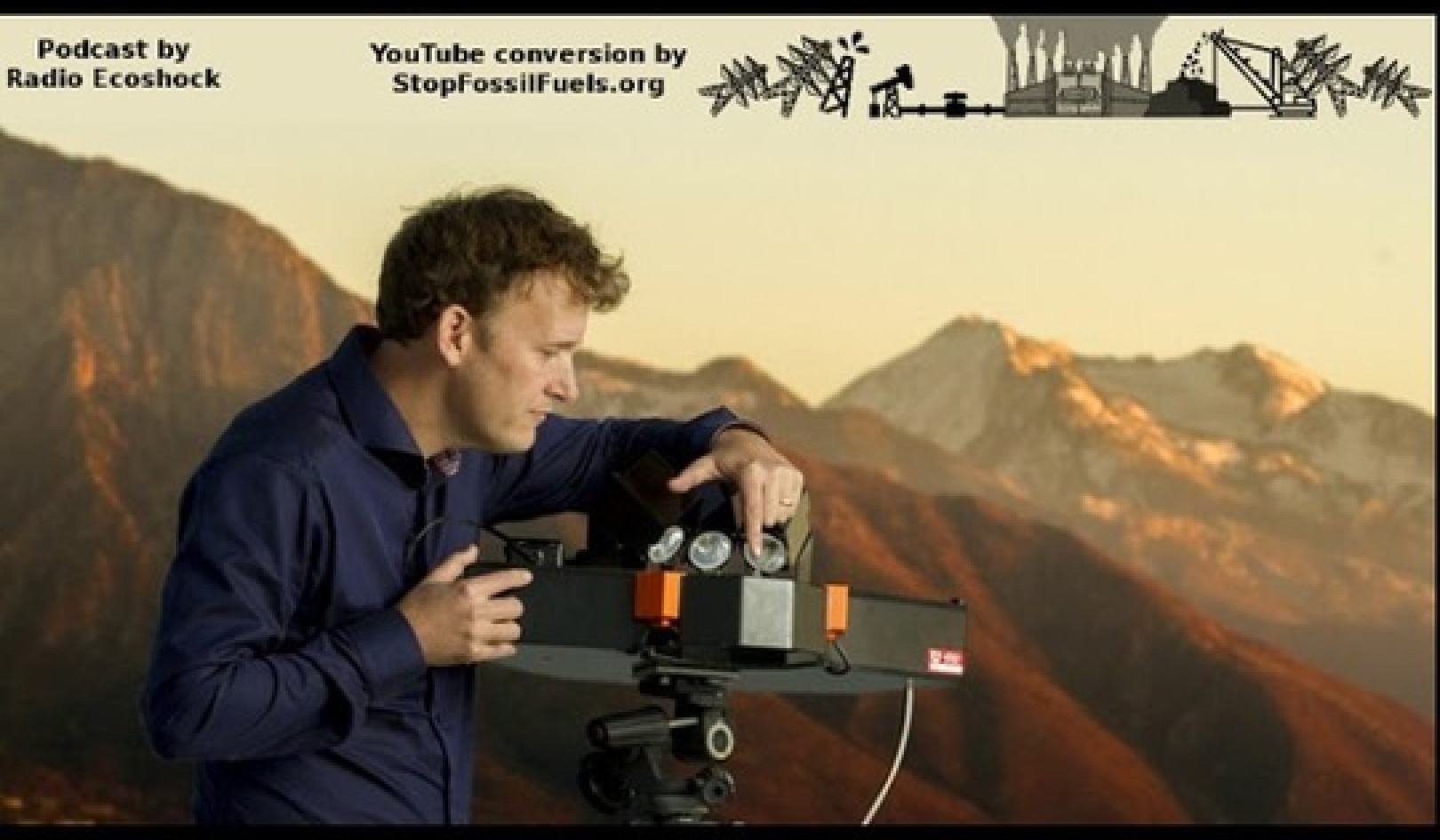
Image by Daniel Hannah
Making changes requires purposefulness. We have to really wake up to the fact that we are not machines randomly responding to chance events in the world. We are actually a purposeful consciousness.
Both the philosopher Sri Aurobindo of India and the Jesuit priest/scientist Teilhard de Chardin in the West got it right: The universe has a purpose. It evolves in order to make better and better representations of those values that we call love, beauty, justice, truth, goodness—all those things Plato called archetypes. When we wake up to this purposefulness, we get a focus.
Without tuning into the purposefulness of the universe, it all seems meaningless. Then we become hedonistic, we pick up attention deficit disorder, and become involved in looking at things that are pleasurable and avoiding things that are painful. Life with just ordinary dreams, you know, obtaining a big house, an expensive car and other pleasurable things. And with that mindset, your elected representatives are not going to have big dreams either.
The Real American Dream
The real American Dream is about the pursuit of happiness, not pleasure. What’s the difference? Pleasure is molecular chemistry; too much pleasure always ends up in pain; but have you ever had too much happiness which is expansion of consciousness?
We forget that it is the pursuit of life, liberty and happiness that we seek. Our politics has to help with that. Life means living; our experiences count, all of them—sensing, feeling, thinking, intuition. Liberty ultimately includes creative freedom. Without creative freedom, liberty means not much to many of us. If liberty is just liberty to choose the flavor of ice cream that I like, I can do without it.
Really, joking aside, we have lost touch with the necessity of creative freedom. Today we have crises on our hands, so we need innovation and creativity to get us out of these situations.
A Radical Change in Our Worldview Is Needed
Certainly, a few people are talking about creativity again. However, what we need is to not only talk about creativity, but rather, we must consider an entire paradigm shift, an altogether radical change in our worldview that can give creativity back to us beginning with giving it legitimacy. We have got to let go of these myopic religious or materialist worldviews of the old that negates creativity and embrace the new quantum worldview, embrace meaning and purpose.
We need new leaders, creative leaders who would teach us about new meaning and take us to a solution space instead of blaming others for creating problems. I wish it were simple. I wish we could tell our politicians what buttons to push to solve our problems. I wish there were buttons, but there aren’t.
The creative process is what leads us to purposeful changes; we even know how the creative process works. In older times, creative people had to act from blind faith. I don’t see too many politicians doing that today! Indeed, there were very few creative politicians in the “good old days.”
Focused Doing and Relaxed Being
Button pushing works only with material machines. We are human beings, and our creativity is latent only because we succumb so totally to our conditioning. To circumvent conditioning, we have to adopt an entirely different practice than button pushing.
That said, creativity requires focused purposeful preparation and waiting for things to gel in the unconscious, which we call unconscious processing. Only after a repetition of this focused doing and relaxed being in tandem for a while, do-be-do-be-do, comes insight. Then, we have to manifest that insight into a product. That product could be a new policy that solves the current immigration crisis.
That product could also be a new us, which of course is what we call transformation. The very way that we sort things out in the world changes. This kind of change is not easy, but on the other hand it is not difficult either. It is this kind of change that gives a politician moral authority.
Mythos and Logos
Our arts, humanities and social sciences, and religion and spirituality, all have order, regularities. The behaviorists’ mistake is to think that the order comes from causal laws. But these regularities are not lawful like those of material science. Instead they seem to play out purposeful storylines that we depict with what we call mythos—mythology.
Mythology is not just a phase that our social development went through as many sociologists think. Rather, mythology defines sociology, culture, and history.
To humanists, and who can deny the humanistic influence on liberalism, the non-religious half of the players of the game of politics, mythos is as important as logos in shaping human drama.
The Hero’s Journey and The Holy Grail
One of these mythical storylines that play a very important role in politics is called the hero’s journey. In the first stage, the hero sets out on a journey to find truth or wisdom, including political wisdom. In the second stage, the hero, through much trial and tribulation, discovers this wisdom. Then in the third and final stage, the hero returns triumphant.
In another mythological story, the myth of the Holy Grail, there is something wrong in the kingdom, but at first our hero sees it and does not say anything because of socio-cultural conditioning. Only after much work (hero’s journey?), the hero gets enough courage to ask, “What’s wrong here?” And the kingdom is healed.
Do you see how important it is that our political leaders bring back these mythological storylines in our political play in their true essence, not faking them? You have to go back all the way to Martin Luther King and John Kennedy before you find a genuine hero in American politics. But remember! Both King and Kennedy grew up with a modernist worldview, and that made all the difference.
Well, today’s leaders are confused because of their incomplete worldview; so faking is the best they can do. How can you see clearly when you wear blinders? So, we go through the ritual of leaders bringing “real change” in America every four years. Of course, nothing much has changed.
The Quantum Worldview
In the quantum worldview, the world is not entirely run by logos; it can’t be. In quantum science within the primacy of consciousness, matter is hardware in computer lingo. We use matter to make a software representation of not only consciousness in the form of the self but also of our subtle experiences in the form of brain memory and the functional software for the body organs.
The material hardware indeed follows physical laws. But just as in the working of our silicon computers, the hardware laws can tell us nothing about the behavior of the software.
In the silicon computer, we make software to map our mental storylines via algorithms and process them consciously. It is the same thing we do with our bio-computer except that there is no algorithm, not always.
Do these storylines have any order at all? Of course, they do; if they did not, there would be no arts, no humanities to learn about. The order comes from the guidelines of the supra-mental archetypes.
Let me just add that our mythology is the history of the play of these guidelines. As the philosopher William Irwin Thomson wrote, “Mythology is the history of the soul.”
©2020 by Amit Goswami. All Rights Reserved.
Excerpted with permission of the publisher,
Luminare Press: LuminarePress.com
Article Source
Quantum Politics: Saving Democracy
by Amit Goswami, PhD
 Our democracy is founded upon the ideal of giving equal access to human potentialities of life, liberty, and happiness to all its citizens. Today, in Trump’s America, we are far from that ideal. This book considers both the short-term problem of politics, namely erosion of values, elitism, and worldview polarization, and, of course, Trumpism and the long-term problem of how to make politics into a real science for making an equitable society. Quantum Politics uses the new science and demonstrates that democracy is the only scientific way of governing a nation. The key is to bring human values and creativity into the picture and combine the exploration of power with the exploration of love. In this way, we can integrate the values in our society with every human being.
Our democracy is founded upon the ideal of giving equal access to human potentialities of life, liberty, and happiness to all its citizens. Today, in Trump’s America, we are far from that ideal. This book considers both the short-term problem of politics, namely erosion of values, elitism, and worldview polarization, and, of course, Trumpism and the long-term problem of how to make politics into a real science for making an equitable society. Quantum Politics uses the new science and demonstrates that democracy is the only scientific way of governing a nation. The key is to bring human values and creativity into the picture and combine the exploration of power with the exploration of love. In this way, we can integrate the values in our society with every human being.
For more info, or to order this book, click here. (Also available as a Kindle edition.)
About the Author
 Amit Goswami is a retired professor of physics. He is a revolutionary amongst a growing body of renegade scientists who, in recent years, has ventured into the domain of the spiritual in an attempt both to interpret the seemingly inexplicable findings of curious experiments and to validate intuitions about the existence of a spiritual dimension of life. A prolific writer, teacher, and visionary, Dr. Goswami has appeared in the movies What the Bleep do we know!?, Dalai Lama Renaissance, as well as the award winning documentary, The Quantum Activist. . He is the author of numerous books, most notably: The Self-Aware Universe, Physics of the Soul, The Quantum Doctor, God is Not Dead, Quantum Creativity, Quantum Spirituality, and The Everything Answer Book. He was featured in the movie What the Bleep Do We Know!?, and the documentaries Dalai Lama Renaissance and The Quantum Activist. Amit is a spiritual practitioner and calls himself a quantum activist in search of Wholeness. For more information, visit www.amitgoswami.org
Amit Goswami is a retired professor of physics. He is a revolutionary amongst a growing body of renegade scientists who, in recent years, has ventured into the domain of the spiritual in an attempt both to interpret the seemingly inexplicable findings of curious experiments and to validate intuitions about the existence of a spiritual dimension of life. A prolific writer, teacher, and visionary, Dr. Goswami has appeared in the movies What the Bleep do we know!?, Dalai Lama Renaissance, as well as the award winning documentary, The Quantum Activist. . He is the author of numerous books, most notably: The Self-Aware Universe, Physics of the Soul, The Quantum Doctor, God is Not Dead, Quantum Creativity, Quantum Spirituality, and The Everything Answer Book. He was featured in the movie What the Bleep Do We Know!?, and the documentaries Dalai Lama Renaissance and The Quantum Activist. Amit is a spiritual practitioner and calls himself a quantum activist in search of Wholeness. For more information, visit www.amitgoswami.org





























